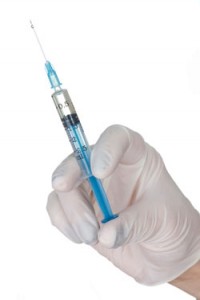
It is important to protect our dogs and cats from contagious disease. At Lakewood Animal Hospital, we only vaccinate healthy individuals. An unhealthy individual’s immune system can potentially be stressed by the vaccine, resulting in illness or the inability to develop adequate immunity from the vaccine. Vaccines are given to protect against life threatening diseases – specifically distemper, parvovirus, and rabies in dogs; panleukopenia and rabies in cats. Other diseases such as kennel cough caused by bordetella or upper respiratory viruses causing illness in cats are treatable – we vaccinate for these after discussion regarding lifestyle and risk of exposure (i.e. travel, boarding, dog parks).
Although the vaccines we use are very effective at protecting against these acute diseases, we recognize that vaccines can be a risk factor for development or worsening of diseases such as autoimmune conditions, including cancer. At Lakewood Animal Hospital, we may discontinue vaccinating in your pet’s senior years. Many senior pets are coping with aging and illness issues and vaccines can cause potential stress. Above all else, we respect your choice to decline all vaccinations – we discuss the risks of vaccinating or not vaccinating and will respect each family’s decision.
How long does immunity last?
As vaccines are developed, pharmaceutical companies must ensure their overall safety, and prove their ability to stimulate immunity that will be effective for one year, in the case of adult animals. In the past, this is where the recommendations for annual booster vaccinations originated.
In more recent years, independent research is being done to investigate possible negative effects of vaccines, and to test the longevity of immunity beyond one year. Many of our common vaccines have been found to stimulate immunity beyond one year. Many of our common vaccines have been found to stimulate immunity that lasts at least three years. This is why vaccine protocols have become more complex and confusing to many pet guardians.
At this time, vaccine recommendations for healthy dogs are as follows:
A series of 3 vaccines including Distemper and Parvovirus are given starting at 8 weeks of age, and repeated monthly until 16 weeks of age. At this age, the rabies vaccines can also be given.
At one year of age, a booster is recommended for all three – Distemper, parvovirus and rabies.
After these young adult booster vaccines, research has confirmed that immunity will last for a minimum of 3 years against those diseases. However, we recommend that at 2 years of age we start to rotate these vaccines individually on an annual basis. For example – we would start with a parvovirus booster at 2, then a distemper booster at 3, and then a rabies booster at 4 years of age. This protocol is preferable to waiting between 1-4 years of age with no vaccines, and then giving all 3 vaccines again all at once.
These protocols change commonly depending on a dog’s health and lifestyle.
And for healthy cats:
A series of 3 vaccines including Panleukopenia (commonly known as cat distemper), the upper respiratory diseases and rabies are given to kittens one month apart.
At one year of age, a booster is recommended for all diseases including rabies.
Again, after the adult boosters, immunity against panleukopenia is expected to last 3 years. For cats at high risk for respiratory diseases, boosters for these viruses are sometimes indicated annually. Rabies vaccine boosters are only indicated every 3 years.
A rotating vaccine schedule is recommended on an annual basis instead of waiting 3 years before giving all vaccines again in one visit.
Other cat vaccines including feline leukemia are given according to risk and lifestyle exposure.
As research continues, the above protocols will change when possible to ensure both adequate protection against these life threatening illnesses, while minimizing frequency of vaccine boosters.
For those patients not well enough to be vaccinated, or for those families wanting to plan vaccination schedules linked directly to their individual pet, blood tests called Titres can be performed to check for immunity before vaccine decisions are made.
Titre Testing
A titre test is a measure of the antibody level in the blood. The antibody levels may be high in the blood from vaccination or natural exposure. If the antibody levels are adequate (there is debate as to what is adequate), one may confidently postpone booster vaccinations for a period of time.
Make an appointment today to discuss with a doctor what is best for your pet.
